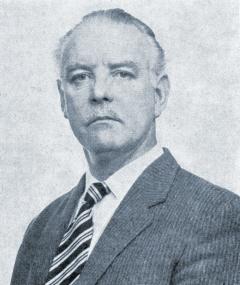
Edward Winter

David Hooper (Chess Life, December 1967, page 363)
Below are some excerpts from the extensive and most amicable correspondence we received from the late David Hooper, with particular emphasis on his views about Paul Morphy.
In an eight-page letter dated 24 September 1984 he discussed various points concerning the Oxford Companion to Chess. For example, we had queried the description ‘small squabble’ for the Morphy-Staunton dispute (on page 217), and he maintained that the term was appropriate:
‘Only one Staunton “adverse” comment is to be found, and this occurred after considerable harassment by Edge, who pressed his claims even when Staunton was engaged in tournament play. Entirely a press affair engineered by Edge – of course Staunton had so many enemies that players wanted to believe in a major row. Morphy realized that S. was past his prime and accepted this. S. clearly implied that he would have lost. M. had decided to return to USA and give up chess BEFORE he came to Europe NOT because of lack of Staunton match. We like to correct myths.’
On 29 October 1984 he indicated the extent to which the Companion aimed to change hearts and minds regarding Morphy:
‘Do you think the Morphy myth is finally laid to rest? I think so, and about time. Löwenthal, his keenest defender, eventually got fed up with Morphy adulation. In the later 1860s, after the umpteenth letter from a correspondent asking for yet more Morphy to be republished, he makes a “short” remark – unfortunately I didn’t make a note of this; it is in the Era column. Staunton, of course, never ceased to praise Morphy’s play, and I think he and Morphy remained on good terms – actually both come out of the affair well … Poor Lawson – I discussed the Morphy book at length before publication or completion of manuscript, and tried to offer many pieces of advice (in the form of suggestions) but he was quite resolute to produce the book exactly in the way he had projected 20 or even more years earlier – this was to be his life’s work.’
In March 1988 David Hooper wrote to us:
‘… whatever faults Morphy had, he nevertheless had good manners. He would not himself have so importuned Staunton, we feel sure. For example, how would a leading player have reacted during the stress of a tournament (e.g. Birmingham, 1858) if approached by an agent urging a decision about a match proposal? I doubt whether Morphy saw the lack of a match as a matter of moment. It was common gossip, especially in Paris, that Staunton was a back number (he was 48), not to be taken seriously as a player. Morphy will have heard this. (Of course, Staunton would have been hopelessly outclassed; I think it rather sporting of him, after years of non-serious play, to try and recover his form at the Birmingham T.) I could add a lot more, but I think this old quarrel is lacking in interest now. In fact, I don’t think there was a quarrel between M. and S., merely a manufactured “drama” by a journalist.’
The journalist to whom David Hooper was referring was Frederick Edge.
The following is an extract from a letter dated 29 November 1989:
‘Morphy, of course, was a “wimp”, to use American slang. He was easily the best player of his time and, as we said, his manners were impeccable; but a wimp nevertheless. Why do idolaters defend Edge? They do not realize that by so doing they insult Morphy, who himself would never have been so bad-mannered as to pester Staunton in the middle of a tournament, to discommode Anderssen in his short holiday break, etc. Would anyone but a wimp have done nothing but sit on his backside to be looked after by his mum for more than half his life?’
In a footnote David Hooper added:
‘“Wimp” a feeble, ineffective person – Collins. A fair description of M. for all of his life, except when at the chessboard, where, naturally, he needed to prove himself, as Anderssen observed.’
On 29 October 1984 he told us that the game between Marco and Maróczy in the latter’s Companion entry was ‘probably the best nineteenth-century endgame’, and his letter of 23 November 1984 gave further thoughts on the Companion’s choice of illustrative games:
‘I liked the Mason game – a discovery for me. The Yates game, I am told, was said by Alekhine to be the best game played since WWI – but I have not been able to find this comment – it is certainly Yates’ best game, and not well known. The Miles-Spassky game is as brilliant as any old masterpiece, I think, certainly deeper than most combinative finishes – a great deal better than anything Morphy did, for example. The Morphy-Harrwitz game we gave is really a fine positional game – you will see that the final combination is really quite simple – not really deep. Morphy’s “build-up”, however, is very good for its time – although some of Staunton’s best are as good.’
(We would add here that the alleged comment by Alekhine about Vidmar v Yates, San Remo, 1930 was reported by William Winter on page 113 of Kings of Chess. On page 13 of the 1934 collection of Yates’ games W.W. merely attributed the quote to ‘a most competent judge’.)
David Hooper’s letter of 24 September 1984 answered a question from us about whether the entry on Golombek in the Companion had intentionally made no mention of H.G.’s The Encyclopedia of Chess, published by Batsford. David Hooper (who had been a contributor to the Encyclopedia) replied:
‘Yes. It is an appalling book, and if subjected to a thorough examination would reveal pages of real errors, not to mention H.G.’s appalling style – his are the worst entries for style.’
On 7 October 1992 David Hooper expressed dismay at the dwindling quality of Batsford’s chess books:
‘I see little hope from Batsfords (what a fall from their great days of the past) or from BCM, to which I no longer subscribe.’
He added that the sole published chess news he saw was in William Hartston’s column in The Independent. On 18 May 1992 he had indicated that he shared our view of N. Divinsky’s catastrophic Batsford Chess Encyclopedia, and on 20 November 1992 he told us that he had submitted a letter which ‘severely criticized Batsford for its poor quality’. However, ‘I don’t think my letter had much effect, as Batsfords appear to believe all their books are good’. Also on 20 November 1992 he told us that the entry on ‘pseudo-opposition’ in the second edition of the Companion contained ‘our little joke’ (cf. the entry on ‘opposition’ in Divinsky’s book). In the same letter he intimated that part of the Companion’s write-up on Batsford’s then chess adviser was intended to be negative (‘anyone who reads between the lines must surely see our point’), but in a postcard dated 5 March 1993 he acknowledged that the entry had been ‘over-subtle’. [These were references to Raymond Keene, about whom David Hooper wrote to us on 4 April 1993: ‘He is a capable organizer, at any rate, notwithstanding many faults. In any case he will dig his own grave (is that the expression I want?) in due course.’]
In our exchanges, Capablanca was discussed many times, and here we conclude with a nugget presented by David Hooper on 10 May 1990:
‘For safe keeping (please don’t lose) I attach a cutting (incomplete). This is the only written reference I found to a match against Delmar on 27(?) September 1908. It will almost certainly be from Diario de la Marina (Havana), and I expect you will be able to obtain the rest of the report. I was told about the match more than once, but that is not evidence. I paid little attention at the time because Brandreth and I were searching only for games for The Unknown Capablanca. As I understand this match, Capablanca, offering pawn and move, undertook to win every game. I believe he won the match, probably picking up a good stake – he desperately needed money at the time.’
The cutting was indeed kept safe, but no additional information has been located. It will be interesting to see whether a reader can provide any details about Capablanca v Delmar.
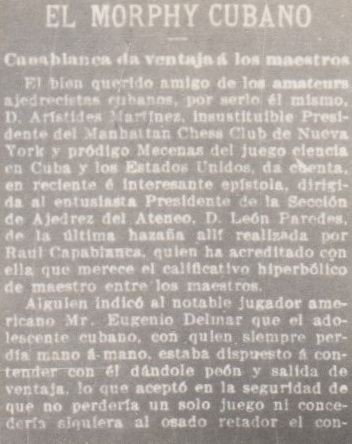
The present item has offered just a brief sample of excerpts from David Hooper’s letters and postcards to us (a total of some 50 or 60), and many of his blisteringly frank comments on chess figures past and present have been held over. An admirable feature of his correspondence was forthright objectivity about his own published writings, which he could view and discuss almost as if they had been written by a third person. David Hooper, a truly great chess writer, died on 3 May 1998 at the age of 82.
(3227)
Louis Blair (Carlinville, IL, USA) writes:
‘David Hooper’s comments about Morphy, Staunton and Edge should not go unchallenged.
(A) How can one sensibly believe that only one “adverse” comment by Staunton on Morphy is to be found? Below are some statements by Staunton in his Illustrated London News column:
28 August 1858: Staunton publicly portrayed himself as waiting for Morphy to be “forthcoming” with “representatives to arrange the terms and money for the stakes”, while privately he was telling Morphy that he was not ready to make specific arrangements.
13 November 1858: Staunton attempted to persuade the public that he “had shown more disposition to meet [Morphy] than the latter to meet” Staunton.
20 November 1858: Staunton publicly indicated that Morphy “is under the influence of very ill advisors, or ... his idea of what is honourable and honest is very different from what I had hoped and believed it to be”.
4 December 1858: Staunton claimed that Morphy’s actions “plainly [showed] that ‘reputation’ is not ‘the only incentive’ he recognizes”. Since this was contradicting Morphy’s own public statements about his motives, Staunton was, in effect, publicly calling Morphy a liar.
31 March 1860: Staunton publicly accused Morphy of “offensive” behavior and “remarkable ... surpassing vanity”.
(B) David Hooper’s notion that “Edge ... pressed his claims even when Staunton was engaged in tournament play” appears to be a complete fantasy. Edge himself described the discussion as initiated by Staunton and taking place on 27 August 1858, a day that was used for Morphy’s blindfold demonstration and a “soirée”. Five games of the third round of the Birmingham tournament had been played, and Staunton had already been eliminated from the tournament in the second round.
If there was concrete evidence that Edge lied in his description of what happened and when, it seems odd that David Hooper apparently had no great eagerness to produce it. I also had correspondence with him in which he tried to get me to believe this mid-tournament pestering story. When I pointed out the absence of evidence for it, I received nothing more substantive than insults in response.
Moreover, David Hooper has not kept his story straight on this matter, claiming (on page 34 of the January 1978 BCM) that Morphy “(with Edge at his elbow) importuned Staunton on the eve of the tournament”, when, in fact, Staunton himself had confirmed that Morphy was not present at the beginning of the event. Subsequently, as the quotes in C.N. 3227 indicate, David Hooper revised the timing of the importuning and the identity of the person doing the importuning.
It is perhaps noteworthy that the Edge entry in Hooper and Whyld’s Oxford Companion makes no reference to this supposed pestering incident.
(C) As for the row being supposedly “engineered by Edge”, where is the documentation of specific actions by Edge that supposedly accomplished this? How can Edge be blamed for Staunton leading everyone to believe that a match would take place if Morphy was willing to “meet [Staunton’s] wishes” about “the terms of play”? How can Edge be blamed for Staunton privately putting off the specification of those “terms of play” while publicly trying to get people to believe that Morphy was holding up the match? How can Edge be blamed for Staunton deciding that he would not play a match and choosing to put off telling the public or Morphy? These are the things that led to the row.
(D) Perhaps Morphy did not see “the lack of a match as a matter of moment”, but who would doubt that he thought it was of considerable moment that Staunton privately postponed the match, publicly portrayed Morphy as the person holding things up, and, for more than a month, gave his readers no other explanation for the state of affairs?
(E) It may, in some sense, be claimed that Staunton “implied that he would have lost” the match, but this was only after Morphy publicly complained about Staunton misleading the public and the row was under way. Also, it must be remembered that Staunton subsequently insisted that the match would not have been “a fair trial of skill” and argued that he had shown “more disposition” than Morphy to meet over the board.
(F) Both Hooper and Whyld were challenged on their claim that Morphy had decided to give up chess before his 1858 trip to Europe, and neither produced anything specific to back it up.
(G) David Hooper’s assertion that Staunton “never ceased to praise Morphy’s play” is quite misleading. The section on Morphy in Staunton’s Chess Praxis contained no overall assessment of Morphy’s ability. It is true that occasional remarks, such as “masterly manoeuvre”, appeared in the annotations, but Staunton also suggested that Morphy’s results might have been different if his opponents “had more frequently taken him out of the books”, hinted that Anderssen lost because of lack of practice, and declared that Morphy’s games at odds were “of very inferior quality”. See pages 477, 479, 493, 502, 582 and 616 of Chess Praxis; below are some of Staunton’s words from page 616:
“I cannot but think, indeed, that in estimating these [games at odds], as well as many of those Mr Morphy has won upon even terms, his admirers are guided less by the evidence of the games themselves than by the reputation of the players against whom he contested them. Now this is a most fallacious test. If Mr Morphy had given the pawn and move triumphantly to Philidor, and Philidor offered no more resistance than a third-class player, Mr Morphy in beating him has only vanquished a third-rate player.”
(H) David Hooper may “think” that Staunton and Morphy “remained on good terms”, but where is the evidence?
(I) David Hooper apparently wanted others to blame Edge because Anderssen was “[discommoded] ... in his short holiday break, etc.”, but, again, where is there a scrap of evidence that Edge had anything to do with Morphy’s decision to drop his plans to visit Germany? Anderssen decided of his own free will to go to Paris to play Morphy, and, even after losing the match with Morphy, Anderssen wrote that he was “not sorry about” his trip to Paris (a trip for which Morphy had helped to defray the cost).
If David Hooper was “a truly great chess writer”, his writings about Morphy, Staunton and Edge must be among his very worst. I do not see any reason for his claims to receive any more respect than such things as the Morphy-and-women’s-shoes story (see C.N. 2913).
Except where I have specified other sources, the quotes given above can be found in David Lawson’s book Paul Morphy The Pride and Sorrow of Chess. See pages 106, 120-121, 142, 150, 153, 179 and 395.’
(3235)
The above material was given on pages 122-125 of Chess Facts and Fables.
From a postcard which David Hooper sent us on 23 August 1975:
‘[X – we omit the individual’s name] should be ignored, given enough rope he will hang himself. History will accord him no place. I have a little sympathy for Reinfeld. He started with some serious books, found they didn’t pay, that the public wanted drivel (How to win in ten moves) and American pace necessitated mass production of drivel, he developed contempt of chessplayers, including many champions. His Lasker book was good, but sales low and no sequel possible. He had a rapid, keen mind, and found chess masters altogether narrow and often stupid. I think he wrote the Marshall book which makes Marshall look like a moron which is not a bad description anyway. He had a fine mind and had to write drivel to live, and lost all the joy of doing a task well.’
(8436)
Addition on 17 August 2018: The individual in question was James Schroeder.
A letter dated 8 June 1992:
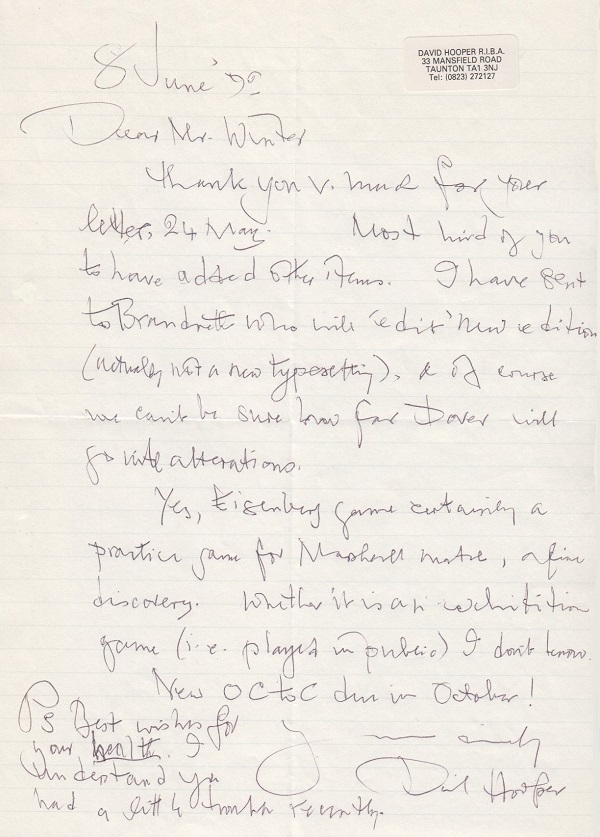
Page 42 of CHESS, 1 November 1958 had this letter from C.G. Coventry Mallet of Lisbon:
‘British chess teams should be confined not merely to British-born players but to players of British blood.’
David Hooper’s response on page 87 of the 13 December 1958 issue:
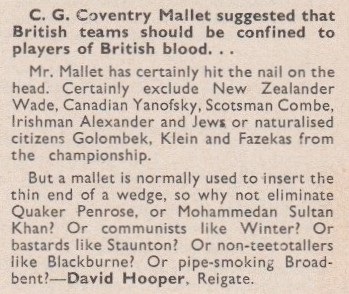
David Hooper made many contributions to Chess Notes. See, for instance, Zugzwang.
Addition on 4 December 2020:
Below is a letter dated 22 February 1978 from David Hooper in a discussion on possible writers of the Morphy chapter for World Chess Champions (Oxford, 1981):
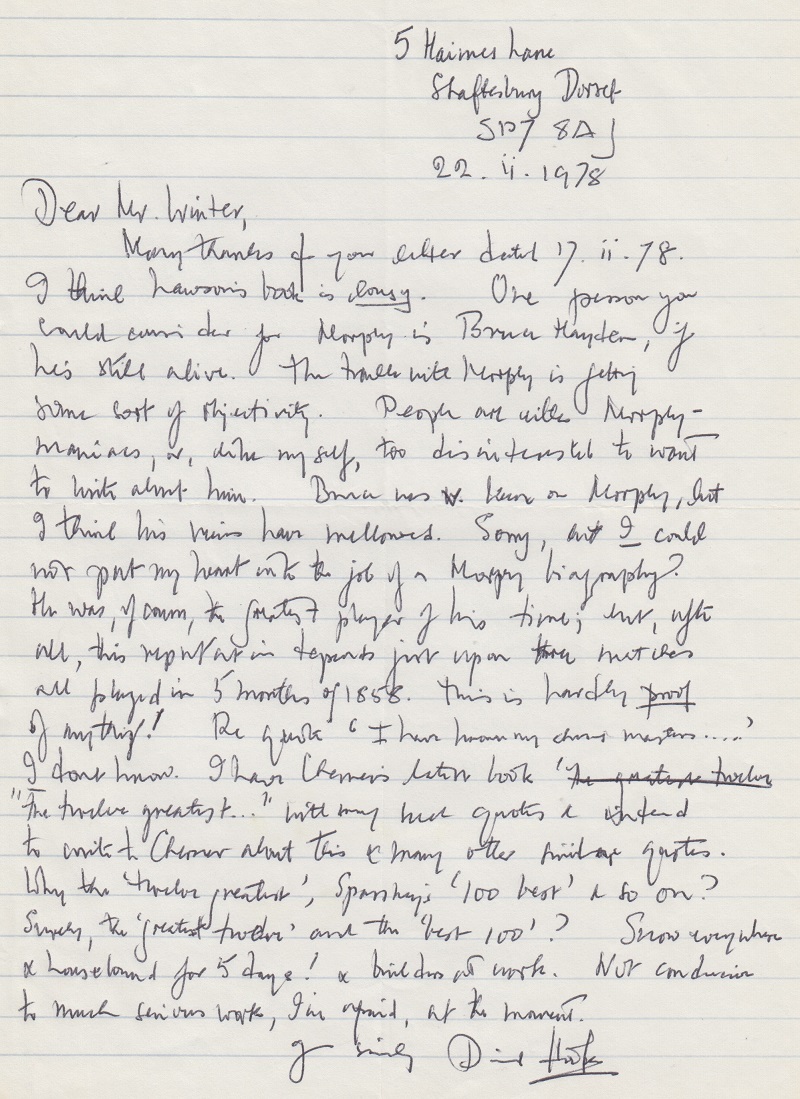
To the Chess Notes main page.
To the Archives for other feature articles.
Copyright: Edward Winter. All rights reserved.